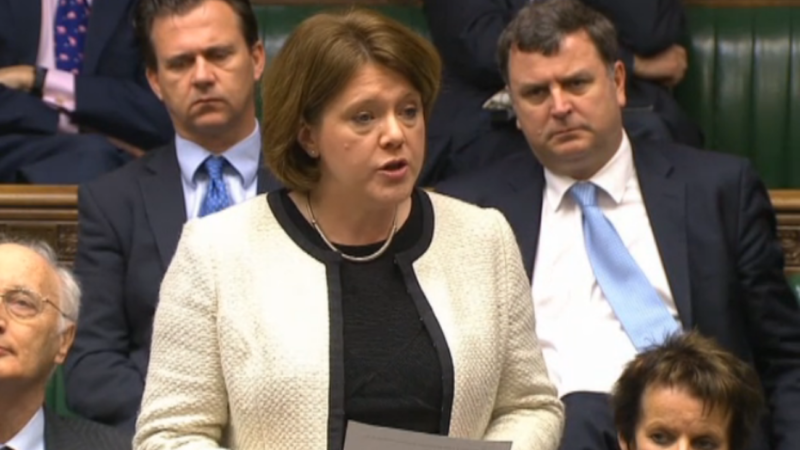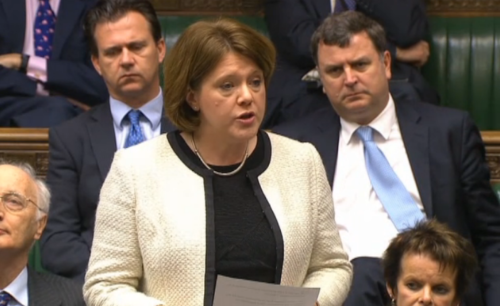
So Maria Miller – after nearly a week of damaging headlines that weren’t going away – has resigned. Such events are always treated as inevitable after the event, but even last night it seemed that the troubled Culture Secretary would attempt to limp on into the recess. She’d have struggled to survive the inevitable late May reshuffle, but she was denied the relative dignity of that overnight.
In truth, this wasn’t a resignation in any real sense. Whilst the official story is that Miller decided it was time for her to stop being a distraction, the reality, as revealed by Gary Gibbon this morning, was that the Tory leadership needed her gone. Cameron – who once held on to Cabinet Ministers for dear life – is now willing to let them go after a bad week. After days of prevarication and stonewalling, Cameron and co realised that her position was untenable. A week that was meant to be about their successes, instead became about expenses. This week the Tories will have wanted the focus to be on the IMF’s growth forecast and welfare. Instead, a man who once seemed to have his finger on the pulse of public opinion found himself mired in the same swamp as his predecessor – expenses.

The 2008 letter that we published this morning – signed by Miller – calling for the right of recall for MPs disciplined by the Parliamentary authorities, only serves to show the difference between 2008 Cameron and 2014 Cameron. Back then, the Tory leader would have done anything to maximise the impact of an expenses scandal. This week he has been trying to mitigate it. His letter to Miller today – saying that he hopes she can return to the front bench – shows little contrition. The slew of Tory ministers hitting the airwaves to argue that Miller was cleared shows no contrition. And Miller’s desperate attempt to blame the media’s response to Leveson certainly shows little contrition.
In fact, although it’s the expenses that sunk her, it was her team’s heavy-handed attempts to stifle the story by referring to the Leveson process that fanned the flames and ensured her demise. Just want to flag that up, you might say…
But if Miller’s resignation and the events leading up show Cameron in a poor light, what does it tell us about Ed Miliband? The Labour leader hasn’t been banging the drum for Miller’s resignation this week, to the surprise of some in the media and the party. Much of the pressure being applied from the opposition benches has come from tenacious backbencher John Mann, who has pursued Miller doggedly for months. Ed Miliband chose to focus on the cost of living and devolution this week instead. There are two key ways in which his approach might be explained:
Labour’s expenses problems: Let’s be clear – the Labour Party has a less than ideal record when it comes to expenses. Although some of the more memorable claims – moat cleaning and duck houses – were Tory MPs, the parliamentarians who were found to be most at fault, and served time in prison as a result, were Labour members. That’s all too easy a counterattack for the PM, which Miliband has thus far denied him.
He’s been burned before: Perhaps most crucially though, is that Miliband has been burned before. On at least two occasions, Miliband has called for cabinet resignations in the heat of the moment, only for events to move on. When Jeremy Hunt was struggling during the phone hacking scandal, Miliband called for him to go. It seemed like the right decision at the time (and I can’t for the life of me understand how Hunt managed to survive bad press and terrible Commons performances, nevermind getting promoted). But Hunt stayed and Miliband’s resignation call was for naught.
Just as memorable though was Miliband’s call at PMQs back in May 2011 for Ken Clarke to resign over comments he’d made on rape in TV interviews. That morning, Clarke went from studio to studio further embarrassing himself and digging himself further into trouble. But hours after PMQs he seemed safe, and Miliband’s call for a cabinet resignation was written off as the rash act of a relatively new opposition leader. Miliband will have wanted to avoid being similarly caught out again.
Although it might now seem like Miller’s resignation was inevitable now – and Miliband may well be tearing up his PMQs questions today and starting again – there are numerous reasons why he wouldn’t have wanted to go too big on a row that could just as easily have blown over – as Clarke and Hunt would be sure to attest.
That said, today in the chamber at PMQs, he’ll still have plenty of ammunition to use on Cameron. Not least – what on earth took him so long? And why was the media response more important than the initial misdeed? And does he agree with Maria Miller, that MPs should be recalled?




More from LabourList
‘The hope that kills you’: Reflections from the final day in Gorton and Denton
MPs, union leaders and organisations react to ‘bruising’ Gorton and Denton result
A gory night for Labour